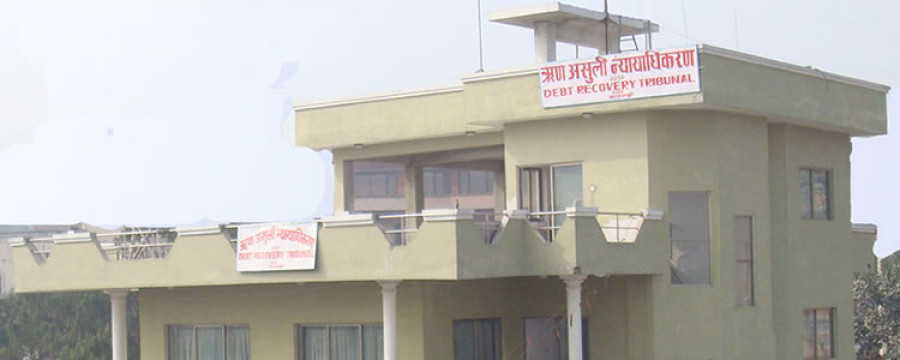National
Covid-19 pandemic affects work of Debt Recovery Tribunal
Just Rs4 billion recovered in the last two fiscal years while Rs5.7 billion was recovered in the fiscal year 2018-19.
Prithvi Man Shrestha
The Covid-19 pandemic badly affected the debt recovery work of the Debt Recovery Tribunal in the last two fiscal years.
The tribunal is responsible for recovering the debts that the banks and financial institutions failed to recover through their own efforts.
It is a judicial body formed essentially to facilitate the recovery of bad debts of banks and financial institutions after the Rastriya Banijya Bank and Nepal Bank Limited, two major banks partially owned by the government, plunged into crises after failing to recover loans worth billions of rupees from wilful defaulters.
According to the tribunal, debt recovery suffered in the last two fiscal years amid the Covid-19 pandemic as it affected the work of the tribunal.
The tribunal recovered Rs2.08 billion and Rs1.99 billion in the fiscal years 2020-21 and 2019-20, respectively. But before the pandemic, in the fiscal year 2018-19, it had been able to recover Rs5.7 billion. Since its establishment in 2004, the tribunal has facilitated the recovery of bad debts worth Rs28.45 billion.
Naresh Raj Aryal, a member (banking) of the tribunal, said debt recovery was affected as its verdicts were either delayed or their implementation were affected due to the pandemic. “In many cases, the verdicts could not be issued on time and their implementation was also affected as our staff were unable to conduct field visits for the evaluation of the collateral property,” he said.
As per the tribunal’s Annual Action Plan 2021-22, it had planned to implement 252 decisions of the tribunal regarding debt recovery. But, it could only implement 135 decisions — a success rate of 53.57 percent.
It had planned to conduct valuations of the collateral assets of the borrowers concerning 201 cases in the last fiscal year but could do so for 30 cases only as the country was hit by the second wave of the pandemic. In the last fiscal year, its work was affected for five months.
Although the tribunal had planned to implement 206 verdicts in the fiscal year 2019-20, it could implement just 129. Similarly, it had planned to conduct the valuation of collateral assets related to 126 cases but could do so in just 24 cases.
“Since the assets evaluation work has to be done in the presence of representatives of survey and land revenue offices, our work was affected in lack of coordination between the government agencies owing to the pandemic,” said Aryal.
Any bank or financial institution with more than Rs500,000 in bad debt can seek assistance of the tribunal for recovering the debt. They have to file a case at the tribunal within four years of default on a loan.
Recovery of bad loans is crucial to ensure that the financial health of a financial institution is robust.
According to Aryal, many borrowers, particularly those who have borrowed auto loans with their vehicles as collateral are less serious about repaying their loans compared to those who have land or house as collateral.
“We have found that the defaulters who have provided land and houses as collateral and those who want to continue their businesses prefer to settle the cases with the banks or financial institutions concerned and do not wait for the tribunal’s verdict,” he said.




 9.6°C Kathmandu
9.6°C Kathmandu














